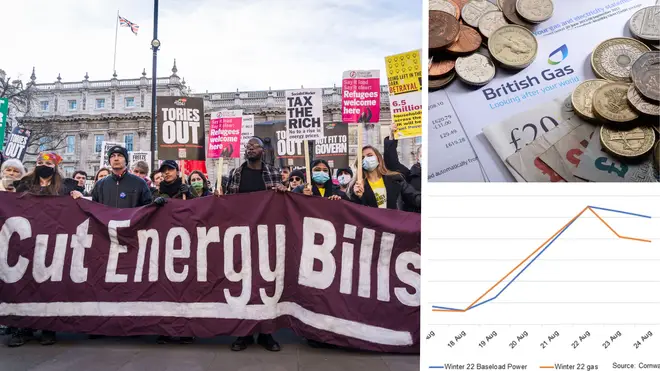
Clive Bull 1am - 4am
26 August 2022, 09:50

The price cap has been hiked to an eyewatering £3,549 a year by Ofgem, affecting millions of households across the UK this winter during the cost of living crisis.
After the announcement, the chief executive of Ofgem urged the incoming prime minister to do more to deal with the impact of energy price rises as the cap on energy bills soared 80% to £3,549 per year.
Jonathan Brearley said the Government would need to add to the support it announced in May when bills were only expected to jump to £2,800.
"The Government support package is delivering help right now, but it's clear the new prime minister will need to act further to tackle the impact of the price rises that are coming in October and next year," Mr Brearley said.
"We are working with ministers, consumer groups and industry on a set of options for the incoming prime minister that will require urgent action.
"The response will need to match the scale of the crisis we have before us. With the right support in place and with regulator, government, industry and consumers working together, we can find a way through this."
Here is all you need to know about today's announcement and what it will mean for you.
The price cap was introduced in 2019 to ensure customer's bills are fair and reflective of costs.
It is a limit on the maximum amount energy suppliers can charge for each unit of gas and electricity a household uses but the cap concerns the rates of your bill rather than your bill itself.
📣The energy #PriceCap is changing and this could affect you
— Ofgem (@ofgem) August 26, 2022
Record high global gas prices mean on Saturday 1 October the energy price cap will rise to an average of £3549 per year
Tap for more⬇️
Energy prices soared throughout 2021 due to a combination of gas stocks, the war in Ukraine and economic stress during the pandemic.
It is an international issue and is not something which solely affects the UK.
Read more: Just Stop Oil protesters smash petrol pumps and block service stations across central London
The price cap increase will affect you if you are on a default or standard energy tariff or a variable rate tariff.
If you never switched to a new tariff after your existing deal ended or you were moved to a new supplier after your old supplier stopped trading it is likely you will be on the above tariffs.
You will be affected whether you pay by direct debit, standard credit or pre-payment meter from October 1 when it is likely you will see higher energy bills.
If you are on a fixed-term energy tariff, you will not be affected.

Tom: Rishi needs to drop out so new PM can help with cost of living
Consumer champion Martin Lewis has said the rise in the energy price cap means some people will pay up to £10,000 a year in bills.
The Money Saving Expert has built a new calculator to show how much extra you'll pay under the October price cap unit rates. You can check how much you will pay here.
The Trades Union Congress has said energy bills will rise 35 times faster than wages and 57 times faster than benefits in the last three months of this year, after the energy price cap was hiked by 80%.
It added that while average nominal wages will rise by £1,470 in the year to October, energy bills will soar by £2,270 in the same period, leaving workers £800 worse off.
Read more: What can households do to cut back on their energy use?

Ex-Ofgem chief explains energy price cap
Cornwall Insight predict that from January, households will be paying an average of £4,101.74 whilst this increases to £5,054.53 from July next year.
The calculations show a 15 per cent increase in wholesale prices in the last week but these figures are potentially subject to significant change both up and down.
Read more: As energy bills soar, what are your options for trying to cope with them?